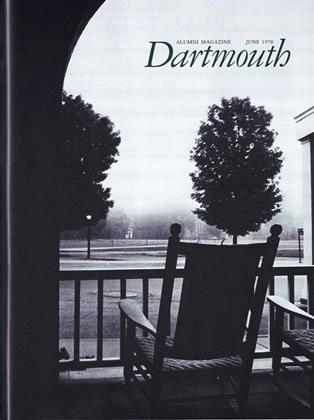With the U.S. Supreme Court all but certain to hand down a decision - or perhaps a non-decision - in the Bakke Case before the current term ends late this month, our -readers at this reading may well know a lot more than we do at this writing about the fate of affirmative action programs at Dartmouth and elsewhere across the land. If, as many people anticipate and more hope - the decision skirts the major constitutional issues, the effects should be less than cataclysmic. Dartmouth's affirmative action officer, for one, speculates that the case "will be decided on very, very narrow grounds," which she considers all to the good.
Professor Diane Pinderhughes of the Government Department has spent the spring term in Washington directing the activities of a group of undergraduate public service interns, so we called her up early this month to ask how it looked from there. In addition to being on the scene, we understood she had been doing considerable research on the Bakke Case.
"There are plenty of rumors going around," she told us from the Brookings Institution Library, where she's been working, "but of course nobody really knows." Not having lived in Washington before, she added, she wasn't even sure whether the rumor mills were working harder than usual.
We asked her about speculation on when a decision might be forthcoming. "Two weeks ago, everyone seemed sure that the announcement would be made the following Monday, but nothing happened," she said. "Now a lot of people see the delay as an indication that the court is split 5-4, that a decision has been put off while the justices work on each other to make a clearer majority."
"For myself," she commented, "I can't see it as a decisive decision. There are just too many questions in this particular case. That there is division in the court seems probable, because it's not a case that lends itself to easy decision. I can't see it as unanimous; I think there will be at least three holdouts."
'The fact that the implications are so enormous, some people feel, has discouraged the court from attempting a broad decision," Pinderhughes told us. "One of the scenarios has it that the court will remand the case to California for 'clarification.' " On the other hand, she added, "Eleanor Holmes Norton, the chairman of the Equal Employment Opportunity Commission, was quoted the other day as saying that she doubted the decision would necessarily have any effect on administrative action."
"Another thing that clouds the whole issue," Pinderhughes suggested, "is that lots of schools [including Dartmouth] have undertaken affirmative action programs on a voluntary basis, and there is no reason to assume there would be a demand that those programs should be discontinued just because the court found for Bakke. If there is a real commitment they can continue. The major question is what the public response would be if the programs were no longer required." There is no question either, in her view, that "the effect would be chilling if the court is unwilling to commit the nation to affirmative action. It might be a long time before a different court would overturn the decision."
Kate Pressman '73, who next year will have an insider's perspective on the Supreme Court as a law clerk to Associate Justice Byron White, agreed that up to mid-June everybody was wondering, but that none of the oft-quoted "usually reliable sources" knew anything. "Friends of mine who are clerking at the Supreme Court refuse to say anything - as they ought to," she said.
 View Full Issue
View Full Issue
More From This Issue
-
 Feature
FeatureShhh. There still are idealists abroad and they're called the Peace Corps
June 1978 By Dan Nelson -
 Feature
FeatureHonorary Degrees
June 1978 -
 Feature
FeatureThe Valedictories
June 1978 -
 Feature
FeatureFancies, Toyes and Dreames
June 1978 By Mark Hansen -
 Class Notes
Class Notes1974
June 1978 By STEPHEN D. SEVERSON -
 Article
ArticleBad Times to Big Time
June 1978







